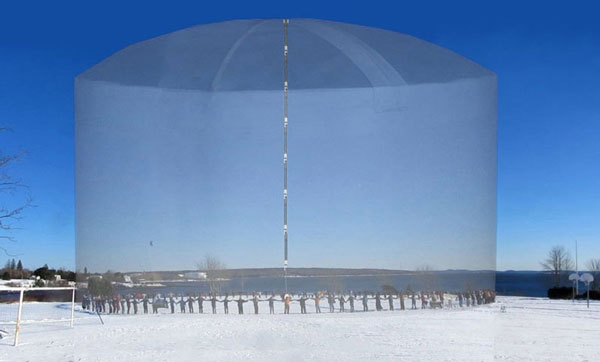Consultant Says Big Tank for Searsport
a Bad Idea
by Steve Cartwright

Graphic scale rendering of proposed LNG tank in Searsport, Maine. Local opponents of the project form the base circumference of the tank. The tank would be built on an island near existing liquid fuel tanks.
Steve Cartwright Photo
The proposed 22 million-gallon propane gas tank proposed for Searsport should not be built, according to a report commissioned by opponents of the project.
The report by Richard Clarke of the firm Good Harbor, says that, “Regional public safety and security resources are not currently sufficient to address a significant land-side or maritime incident,” and that “the potential for failure of safety and other mitigation measures is increased due to the site’s physical constraints.”
In sum, the report says, “Based on the information reviewed, including applicant submissions, permitting documentation, regulations, as well as other findings, GHT recommends not proceeding with the project as currently proposed.”
Clarke’s report will be the subject of a Searsport Planning Board public hearing on Feb. 11th, part of continuing sessions where the tank proposal has been hotly debated. Clarke was a counter-terrorism advisor to President Bush and Clarke reportedly warned to no avail of a possible attack prior to the deadly 9/11 incidents.
A local group called Thanks But No Tank has raised many issues related to the tank, including hazards to public safety, inadequate area resources in case of disaster, and the visual impact of the tank on the region’s tourist, sailing and second-home economy. Several island communities, Islesboro in particular, have formally expressed concern about the tank, including so-called exclusion zones that could affect fishermen as tankers ply the bay on their way to and from the Mack Point tank.
The Clarke report was prepared for the Islesboro Islands Trust.
Both the report and opponents of the tank have raised the issue of whether the facility is for importing liquid propane gas (LPG) or exporting it. DCP says it’s for import only, but there is reportedly no shortage of gas in Maine or the entire U.S. There is, the report says, a surplus. If the tank were built, would DCP then say it wants to export gas?
The proposed tank would be 14 stories tall, considerably higher than existing oil storage tanks at Mack Point. In 2011, townspeople voted to raise the height limit from 60 to 150 feet, and in a separate vote defeated a six-month moratorium on the project, proposed by DCP Midstream, a separate offshoot of the oil giant Conoco Phillips and gas giant Spectra Energy (also Duke Energy).
The tank already has permits from the Maine Fuel Board and the state Department of Environmental Protection and U.S. Army Corps of Engineers.
Rosslyn Elliott, spokeswoman for DCP, said, “the Good Harbor report is questionable on many fronts. It makes several assertions without any backup. The one point it gets right is that there is a low risk of terrorism.”
Elliott called Clarke’s conclusions “anti-climatic and a long purposeful delay for an end result that is lacking in substance. The report is essentially a commentary on Federal statutes and does not pertain to the town ordinances. It questions the integrity of the Army Corps and the USCG, which is insulting given the high standards of those agencies. We look forward to addressing the report’s inadequacies.”
Searsport Planning Board Chairman Bruce Probert has worked 38 years for Sprague Oil Company – which has an existing tank farm in Searsport. In a 2011 interview, he told this reporter: “It’s coming here one way or another.”
